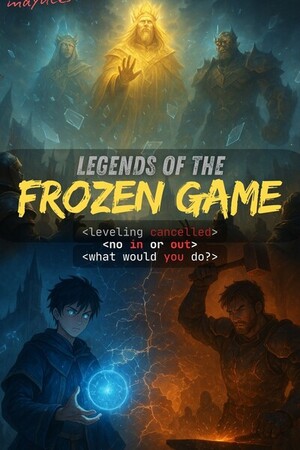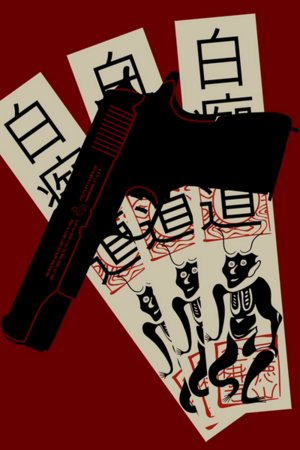Chapter 6:
Green-Eyed Man
The Soundless Cut
A maze of glass towers, mirrored walls, and harbor lights.
Half-Japanese, half-Spanish, Kojiro Mendez, 41, a high-rise janitor and failed architect. Kojiro is a registered archiect in Spain. Before going to Japan, he once dreamed of designing skyscrapers. He had talent, but not connections and no high business Nihongo communication skill. While his classmates rose as elite urban designers, Kojiro fell into cleaning their creations.
Every day, he cleaned mirrors that reflected lives he could’ve had.
Every night, he scrolled through their perfect lives, their “award-winning” portfolios, their foreign vacations, their beautiful wives.
His favorite word was: "unfair."
“They stole my life,” he muttered into his mop water one night. “They don’t deserve it.”The 43rd Floor – Midnight
Kojiro walked the glass corridor of the elite tower.
His shoes echoed sharp against the polished floor.
On the mirrored wall beside him—
His reflection lagged.
A beat too slow.
Like it didn’t want to follow.
He stopped.
Wiped the glass with his sleeve.
Forced a grin.
“Come on, Kojiro,” he whispered to himself. “Or should I say… Architect Kojiro.”
He smirked, but his eyes didn’t smile back.
At his locker, he overheard two colleagues talking in excited Kansai dialect.
“Getting married next spring. We booked Notre Dame Yokohama Minato Mirai—3.0 million yen, but she deserves it.”
The other laughed. “But we still hitting the Philippine pub tonight, right? One last taste of freedom.”
They didn’t notice Kojiro standing nearby, listening in silence.
On his way home, Kojiro passed a luxury Vellfire at a red light.
Inside? a family―father, mother, two kids—all laughing, lost in a world that didn’t include him.
Across the street:
A young couple filming their 8th monthsary vlog under fairy lights.
Selfies. Kisses. Hashtags.
The world spinning on without him.
He clenched his fists in his coat pockets.
“Some people are born to have everything,” he thought.“And some of us… are born watching.”
Back at his apartment, the silence was suffocating.
Blueprints covered the walls—
Others’ names slashed in red ink.
TANAKA.
KOBAYASHI.
FUKUDA.
All the ones who got ahead.
All the ones who took what should’ve been his.
He sipped from a chipped mug that read:
“Future Architect.”
The words were fading.
Flashback ― in the Age of Kenshin
Long ere Kenshin laid eyes upon fair Yuriko, there was a great feast held in honour of a hard-won victory. The warriors of the bushidan gathered beneath lantern light, their cups full, their spirits higher still. Women from allied clans were summoned to bring mirth and comfort to the weary blades of war.
The leader of the band did summon Kenshin forth, bidding him sing one of his sorrowful compositions. And so he stood, solemn yet proud, singing ballads of death, of sacrifice, of grief eternal—songs born not of revelry, but of remembrance.
Yet not all hearts were moved.
Among the ranks stood a man named Shingen, a warrior whose heart was laced with envy. He did whisper unto others, “Why must we listen to such dirges? Kenshin's words are naught but shadows and woe. Let the women entertain us instead!”
Jealousy grew within him like a poison vine.
When news reached his ear that Kenshin and Yuriko, the emperor’s daughter, had grown close in secret, Shingen did pen a treacherous scroll. In it were laid bare secrets of the forbidden romance and the truth of the Songblade’s legacy. That message found its way to the ears of those in power.
Kenshin was seized.
The order for execution was swift. A black-masked headsman raised his blade—and Kenshin’s head was severed from his body, falling to the soil like a blossom in the wind.
Behind the veil of shadow, Yuriko wept. And when the mask was removed, she beheld the face of betrayal—it was Shingen who had borne the axe.
Three moons passed.
In secret rites soaked in sorrow and incense, Yuriko did call upon ancient forces to raise Kenshin’s spirit from the otherworld. And so returned the one they now call the Headless Samurai.
Yet Shingen, unaware of the ghost he’d awakened, came once more to Yuriko. With honeyed lies, he sought her hand, masking his lust with feigned remorse. When she spurned him, his heart blackened with wrath. One night, he did seize her, seeking to claim by force what love had denied.
But lo, in the stillness of the dark…
A cold wind rose.
The Headless Samurai appeared.
And with but one stroke, envy was silenced.
Yuriko, trembling, laid her hand upon the ghostly armor and whispered:
“Thou hast silenced envy… six more sins remain. Together, we shall strike them down.”
And so it came to pass, that every ninety days henceforth, the land bore witness to strange and bloody reckonings. The whisper of hooves, the gleam of a ghostly blade—signs of the silent purge that marched beneath the moon.
Kojiro’s Midnight Meal
It was just another quiet night. Kojiro sat alone in a dim corner of Sukiya, not far from his apartment. He scrolled mindlessly through TikTok, his eyes dull from the endless stream of recycled content.
“Why does this untalented clown have a hundred thousand followers?” he muttered under his breath. “He just reposts memes…”
He scrolled again. And then paused. A strange sensation touched his finger—the tip of his index felt… wet. He looked down.
A small black blot of ink pulsed faintly on his skin, like a drop of blood from an invisible wound. It shimmered unnaturally, neither dry nor runny, like it had a heartbeat.
Kojiro blinked. He glanced around.
To his left—nothing.
To his right—someone.
A girl, alone. She stood just outside the glass, wearing a long black coat, a take-out bag of gyudon in one hand, a sketchbook pressed to her chest with the other.
Her eyes met his for a split second.
Yuriko.
But before he could process what she was doing there, his gaze was pulled—dragged, almost—toward the kitchen window.
Behind the stainless-steel curtain of boiling broth and clattering bowls…
There it stood. A figure. Headless.
Draped in dark, tattered armor, standing death-still beside the noodle vats. Its body was turned ever so slightly—toward him.
Kojiro didn’t breathe. He blinked. Gone.
His spoon clattered into his bowl. His breath came in short bursts. He stood quickly, his legs shaking beneath him, and staggered to the counter.
“Cash, fast,” he snapped at the staff, eyes darting.
Moments later, he was on his bicycle, pedaling hard into the chilly night. But something wasn't right. He looked down into the basket strapped to his handlebars. There it was. An old, cracked fountain pen. Black lacquer. Gold nib. The kind nobles used in times long gone. And etched into its side, faint but unmistakable, was a crest… a samurai clan’s symbol… one he’d seen before—on an old scroll about the Songblade legend.
Kojiro whispered, voice trembling:
“This isn’t happening…”
But the ink on his finger had already begun to spread. Like roots.
Apartment Door – 4th Floor
Kojiro staggered down the hallway of his apartment building, breath ragged, heart hammering in his chest. His hands trembled violently—black inkblots bloomed across his skin like mold, crawling up his wrists in sharp, root-like patterns.
He fumbled at his belt. Dozens of keys jingled against each other in a chaotic symphony. Keys for the glass tower. For lockers. For janitor closets. For every door he’d ever opened but never truly owned.
His fingers darted through the ring, frantic. “Where’s the 404 key?” he muttered.
But the tags had changed.
No longer labeled with numbers, each one now bore a single word—etched in fine black calligraphy:
“Car.” “Money.” “Fame.” “Title.” “Family.”
Things he craved. Things he envied. He dropped the ring. The keys scattered across the floor like insects fleeing light. An acient tune from the wind, "Car... money... fame... title... family... I deserved it." like a song. Then—
A chill coiled in his mouth. A cold, metallic pressure beneath his tongue. Eyes wide, Kojiro reached in and pulled it out—gagging. A key. Old, rusted. Glued to his tongue with thick black resin. Its tag read ― Room 404. And then…
A sting at his neck. Thin. Surgical. Silent. A red line drew itself slowly across his throat, as if from an invisible quill. Kojiro’s body went stiff. His knees buckled. Then—collapse. His head struck the floor with a dull, wet sound and rolled. Rolled down the quiet corridor of the fourth floor, leaving behind a trail of dark ink instead of blood.
Outside Room 404, the key rested. Waiting.
Aftermath
Flashing red and blue lights bleed through frosted hallway windows. The distant hum of a police siren fades into the silence, broken only by the occasional click of a camera shutter and the static hiss of two-way radios.
Kojiro's body lies on the hallway floor—unnaturally still.
No blood. Just a missing head. Keys scattered like offerings around him, glinting under the hallway fluorescents. The scene is disturbingly clean. Almost... reverent. Above him, mounted to the doorframe of Room 404, condensation trails down the surface. Letters begin to emerge in the fogged steel.
“Forgiven.”
Etched like a ghost’s final word. Just beneath it—a single black inkblot. Fresh. Slowly spreading. From behind a slightly ajar door, neighbors peek out. Slippers on tile. Curious eyes. A man in his 50s whispers to the woman beside him, both barely lit by the corridor light.
"This is why I hate the fourth floor. 'Four'... means death."
Between Realms ― Moving Train
Yuriko sat quietly as the train rumbled through the between-realms, its windows fogged with a mist that seemed to breathe.
Only one page remained.
She traced her finger over the name—Kojiro—letting it linger there before gently closing the notebook. The weight of what she’d done settled into her chest like a warm stone.
"Envy has been silenced," she whispered.
Then came the smile—soft at first, then spreading slowly across her face. But it wasn’t kindness that shaped it. It was something else. A private joy. A twisted reverence for the task she had taken upon herself.
There was no guilt. No second-guessing. Only the pulse of purpose.
And in that silence, as the train whispered forward through nothingness, Yuriko tilted her head and murmured—
"Who shall I mark next?"
Her grin deepened, not with madness, but with devotion. Whatever she was becoming, she welcomed it.
She did not look up. She did not pray.
[Next: Not The Minister]




Please sign in to leave a comment.